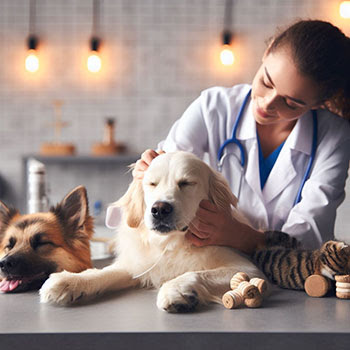The Power of Pet Massage: Benefits
and Techniques for Dogs and Cats
Petting and snuggling with our furry friends is soothing
for both parties. But did you know that targeted massage can provide pets with
even more benefits? Therapeutic pet massage techniques can relieve aches,
improve joint mobility, reduce anxiety and strengthen your bond with your
animal companion.
Read on to learn about the advantages of pet massage and
how to safely incorporate it into your dog or cat's routine.
Ø The Benefits of Massage for Pets
Pet massage therapy isn't just a spa luxury -
it offers proven perks that improve health and wellbeing. Science shows massage
benefits include:
- Easing joint stiffness and arthritis pain 🔴
- Increasing flexibility and range of motion
- Reducing swelling and inflammation
- Promoting healing from injuries or surgery
- Improving circulation and immunity
- Releasing tension and soothing anxiety
- Relaxing muscles and relieving spasms
- Treating hot spots and knotted areas
- Deepening trust and bond with owner
Massage stimulates the parasympathetic nervous system,
triggering the rest, digest and heal response. This helps pets feel calmer and
supports whole body balance.
Ø Choose the Right Massage Techniques
Pet massage involves using your hands to
apply pressure in long strokes, small circular motions, squeezes and other
manipulations. Always be gentle - deep tissue work is rarely needed for dogs
and cats. Some go-to techniques include:
- **Effleurage:** Gliding your palm slowly over the body
to warm up muscles
- **Petrissage:** Gently kneading and lifting flesh
between fingers/thumbs
- **Compression:** Firm but gentle squeezing of muscles
to increase circulation
- **Passive Flexion:** Slowly and gently bending joints
through range of motion
- **Trigger Point:** Light circular pressures on tense,
tender points
Use your intuition to gauge your pet's reactions. Some
spots may be sensitive, so adjust pressure accordingly. Stop if they seem
distressed.
Ø Best Practices for Safe, Effective Massage
To ensure a relaxing, beneficial massage for
your dog or cat, follow these tips:
- Remain **calm and soothing** - pets pick up on your
energy
- Keep sessions **short** at first - 5-10 minutes max
- **Watch** for signs your pet wants to stop
- Stick to **broad strokes** over bony areas
- **Avoid** directly massaging abdominal area, joints or
paws
- **Lubricate** hands with pet-safe oil or lotion
- Sit in a **tranquil space** without distractions
- Give your pet the **option** to move away
- End on a **positive** note with treats and affection
Over time, you can gradually lengthen sessions as your
pet relaxes into the experience.
Ø Target Key Areas for Maximum Impact
While an overall body massage is beneficial,
you can hone in on certain areas to address specific concerns:
**Stiff joints:** Use gentle compression and passive
flexion along the spine, knees, hips and elbows. This eases arthritis
discomfort.
**Sore muscles:** Apply light kneading to the shoulders,
neck, lower back and haunches where tension accumulates.
**Injuries:** Lightly massage around wounds, sprains or
post-surgical sites to reduce swelling and improve healing. Avoid direct
pressure.
**Digestive woes:** With vets approval, gentle tummy rubs
can soothe nausea, constipation or gas pain.
**Anxiety:** Use long, soothing strokes on the head, ears
and chest to relax the nervous system.
Getting feedback from your veterinarian can help identify
your pet's unique massage needs.
Ø When to Avoid Massage
As beneficial as it can be, pet massage is
not appropriate in every situation. Refrain from massaging your pet if they:
- Have a fever, infection, contagious condition or
abnormal lumps
- Are in obvious pain or injured - seek veterinary care
first
- Display aggressive reaction to touch
Pregnant, elderly or very young animals may also be too
sensitive for massage. Always err on the side of caution and stop if you notice
any worrisome symptoms.
Ø Perfect for Bonding and Pampering
Massage offers a healing touch for pets dealing with
anxiety, arthritis, injuries or other issues compromising their comfort. Done
properly, it's also a soothing, low-stress experience that deepens the bond you
share with your companion animal.
Try setting aside 5-10 minutes 1-2 times per week for
some hands-on pampering. Observe your pet's reactions and adjust your massage
approach accordingly. With patience, you can make massage an enjoyable ritual
that benefits your beloved furry friend's body, mind and spirit. They'll feel -
and show - their gratitude!

